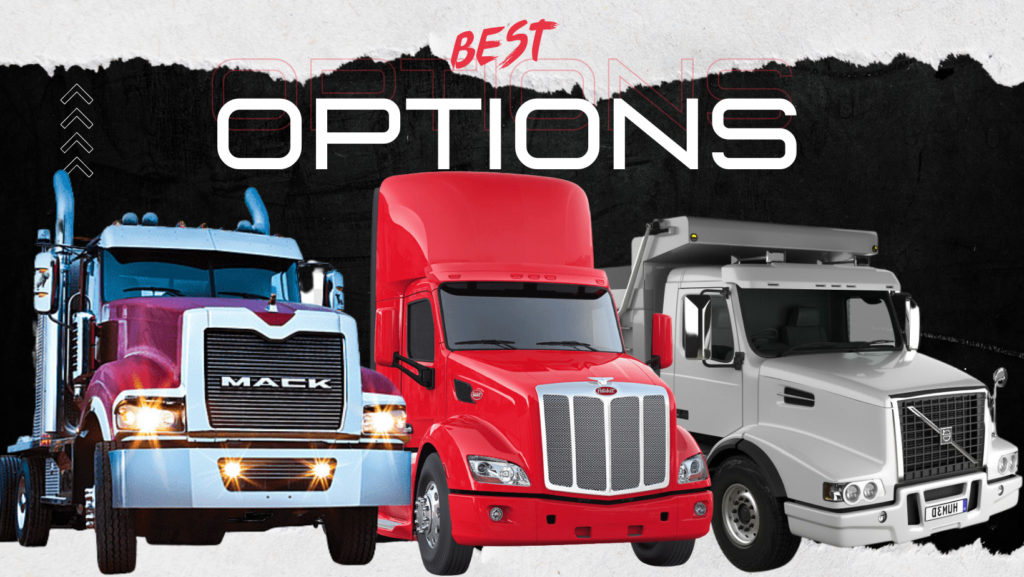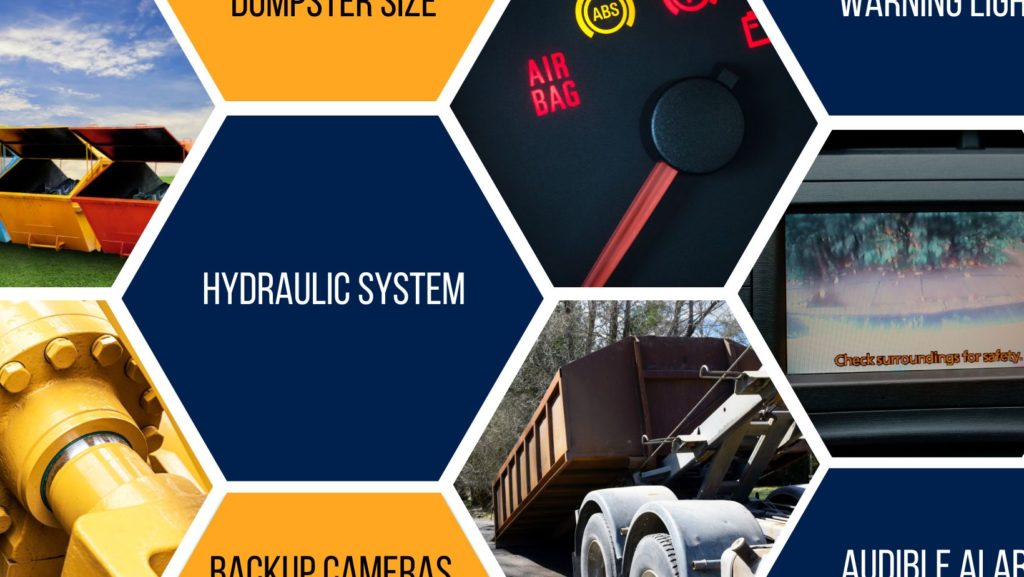Roll-Off Trucks For Sale
The Basics of Roll Off Trucks For Sale
Roll off trucks for sale are specialized vehicles used for transporting large containers or dumpsters. These trucks are commonly used in the waste management industry, construction sites, and other industries that require heavy-duty hauling of materials. Roll off trucks come in different sizes and configurations to cater to various needs.
If you’re looking for roll off trucks for sale, there are several factors to consider before making a purchase. The size of the truck is a crucial factor as it determines its capacity and ability to transport certain types of containers. You should also consider the type of container you’ll be using with the truck, as some containers may require specific features or modifications to the truck.
The cost is another significant consideration when buying roll off trucks for sale. Prices can vary depending on factors such as brand, age, condition, and customization options. It’s essential to set a budget beforehand and look for options within your price range without compromising on quality or safety features.
Trusted Roll-Off Truck Fabricators
If you are looking for roll-off trucks for sale you have come to the right place. DRS offers software to 700+ waste haulers and below are some of the roll-off truck fabricators that our customers have come to trust. Here you’ll find roll off trucks for sale and more.

Keystone Waste Solution (KWS) specializes in dumpster manufacturing, and refurbishing of all waste-handling equipment. Our services include but are not limited to all types of roll off containers, front/rear load containers, specialty containers designed for your application, equipment refurbishing/repairs, mobile truck maintenance as well as consultant services.

On-Trux offers a full range of standard and custom dump boxes and refuse containers to fit all roll-off and hook lift systems, in capacities from 5 to 60 cubic yards. Turn your current medium or heavy duty truck to a dump truck with our various bin options. Many sizes, styles and colors available to fit your needs!
What to Look for When Buying a Roll Off Truck
When buying a roll off truck, it’s important to consider the manufacturer. There are several reputable roll off truck manufacturers in the market, such as Mack Trucks, Peterbilt Motors Company, and Volvo Group. It’s essential to research these manufacturers and their products thoroughly before making a purchase.
Another factor to consider is the size of the roll off truck you need. Roll off trucks come in various sizes, ranging from 10-yard containers to 50-yard containers. The size of your project will determine what size container you require. It’s crucial to choose a roll-off truck that can handle your needs without being too large or too small.

Finally, it’s vital to inspect the condition of any used roll off trucks you’re considering purchasing carefully. Look for signs of wear and tear on both the interior and exterior components of the vehicle. Check for leaks or damage that may indicate underlying issues with critical systems like hydraulics or brakes. By taking these factors into account when buying a roll-off truck, you’ll be able to make an informed decision about which one is right for your business needs without breaking your budget.
- Research reputable roll off truck manufacturers such as Mack Trucks, Peterbilt Motors Company, and Volvo Group.
- Consider the size of the roll off truck needed based on project requirements.
- Choose a roll-off truck that can handle your needs without being too large or small.
- Inspect the condition of any used roll off trucks carefully for signs of wear and tear on both interior and exterior components.
- Check for leaks or damage that may indicate underlying issues with critical systems like hydraulics or brakes.
Roll off trucks are used for a variety of purposes, such as hauling debris from construction sites or transporting waste to landfills. There are several different types of roll off trucks available on the market, each with its own unique features and capabilities.
One type of roll off truck is the hook lift truck. This type of truck uses hydraulic arms to pick up and transport containers that have been fitted with hooks. Hook lift trucks are typically used in urban areas where space is limited, as they can maneuver easily in tight spaces.
Another popular type of roll off truck is the cable hoist truck. This type of truck uses a winch system to load and unload containers onto the bed of the truck. Cable hoist trucks are often used by waste management companies and recycling centers because they can handle large volumes of materials.
When looking for a roll off truck dealership, it’s important to consider factors such as reputation, customer service, and financing options. Some dealerships may specialize in certain types or brands of roll off trucks, so it’s important to do your research before making a purchase decision. Additionally, make sure you choose a dealership that offers maintenance services or has partnerships with local repair shops so you can keep your vehicle running smoothly over time without any hassle.
Roll off trucks are designed to transport large, heavy loads of materials from one location to another. These trucks have a unique feature that allows them to easily load and unload their cargo without the need for additional equipment. The roll off truck features a hydraulic system that raises and lowers the container or dumpster on its back, allowing it to be rolled onto the ground.
The process of loading and unloading a roll off truck is simple. First, the driver positions the truck near the container or dumpster they want to load. They then activate the hydraulic system which lifts up one end of the container/dumpster while keeping it attached at one end. Once lifted, they can drive forward slowly until it rolls off onto the ground.
Once loaded with material, such as construction debris or waste products, these trucks transport their contents safely and efficiently to their final destination where they can be unloaded in much same way as they were loaded – by rolling them gently onto solid ground using hydraulic power.
Roll off trucks are versatile vehicles that offer numerous benefits to their owners. One of the main advantages is their ability to handle a wide range of waste materials, including construction debris, industrial waste, and household garbage. Roll off truck uses also include transporting large items such as machinery or furniture.
Another benefit of owning a roll off truck is its efficiency in handling waste management tasks. With its specialized hydraulic system and container design, it can quickly load and unload containers at job sites or transfer stations. This saves time and labor costs while increasing productivity.
In addition to being efficient, roll off trucks are also cost-effective over the long term. They have a longer lifespan than traditional dump trucks due to their sturdy construction and minimal wear-and-tear on the chassis. Furthermore, they require less maintenance since there are fewer moving parts involved in loading and unloading containers compared to other types of trucks used for similar purposes. Overall, investing in a roll off truck can provide significant returns for businesses involved in waste management operations.
The Importance of Proper Maintenance for Roll Off Trucks
Proper Roll Off Truck Maintenance is crucial for ensuring the longevity and efficiency of these heavy-duty vehicles. Regular maintenance can prevent costly repairs and downtime, which can affect productivity. It is essential to follow the manufacturer’s recommended maintenance schedule, including oil changes, filter replacements, and inspections.
One critical aspect of Roll Off Truck Maintenance is keeping the hydraulic system in good working order. The hydraulic system powers many functions on a roll-off truck, such as lifting and lowering containers. Neglecting this system can lead to leaks or other malfunctions that could cause accidents or damage equipment.
Another important consideration for Roll Off Truck Maintenance is maintaining tire pressure and regularly inspecting tires for wear and tear. Properly inflated tires increase fuel efficiency while reducing wear on suspension components. Inspecting tires regularly ensures that they are safe to use on the road. By following proper maintenance procedures, owners can ensure their Roll Off Trucks operate efficiently for years to come without any major issues arising from neglect or lack of attention to detail during routine checks!
The Top Brands of Roll Off Trucks on the Market

Mack Trucks is a well-known brand in the roll off truck market. They offer a range of models with different capacities, including the Granite and Pinnacle series. Mack also ensures that their trucks comply with Roll Off Truck Regulations to ensure safety on the road.
Freightliner is another top brand for roll off trucks. Their line of Business Class M2 trucks have proven to be reliable and efficient in handling heavy loads. Freightliner also offers customization options for customers who require specific features or designs.
Peterbilt is known for producing high-quality roll off trucks that are both durable and easy to maintain. Their models include the 567, which has received positive reviews from operators due to its enhanced visibility and maneuverability. Peterbilt also prioritizes compliance with Roll Off Truck Regulations to ensure safe operation on highways and job sites alike.
Factors to Consider When Choosing a Roll Off Truck Dealer

When choosing a roll off truck dealer, there are several factors that you should consider. First and foremost, you want to ensure that the dealer has a good reputation in the industry. Look for reviews and testimonials from previous customers to get an idea of their level of satisfaction with the dealer’s services.
Another important factor is pricing. Roll off truck comparisons can help you determine whether or not a particular dealer is offering fair prices on their trucks. Keep in mind that while price is certainly an important consideration, it shouldn’t be the only one. You also want to make sure that you’re getting high-quality equipment that will last for years to come.
Finally, consider the level of customer service offered by the dealership. Are they responsive to your questions and concerns? Do they provide ongoing support after you’ve made your purchase? A reputable dealer should be willing to work with you throughout every step of the buying process and beyond. By taking these factors into account when choosing a roll off truck dealer, you’ll be able to find a reliable partner who can help meet all of your equipment needs.
Financing Options for Roll Off Trucks
Roll off trucks are a significant investment for any business, and financing options can help make the purchase more manageable. Many dealers offer financing plans with flexible payment terms to accommodate different budgets. Before choosing a financing option, it’s essential to consider the interest rates and fees associated with each plan.
When looking for financing options, it’s crucial to keep in mind that safety should always be a top priority. Roll off truck safety tips include ensuring proper maintenance of the vehicle and training employees on safe operation practices. Investing in high-quality equipment may also reduce long-term costs by decreasing repair expenses and minimizing downtime.
Some businesses may opt for leasing or renting roll off trucks instead of purchasing outright. This can provide flexibility in terms of upgrading vehicles as needed without committing to long-term ownership. However, it’s important to weigh the pros and cons of leasing versus buying before making a decision that will impact your bottom line.

Tips for Negotiating the Price of a Roll Off Truck
When negotiating the price of a roll off truck, it’s important to do your research beforehand. Look up the average prices for similar models and conditions online or from dealerships. This will give you an idea of what a fair price range is for the used roll off trucks for sale.
Another tip is to be willing to walk away if the deal isn’t right. Don’t feel pressured into agreeing on a price that doesn’t work for you just because you’ve invested time in negotiations. There are plenty of other options out there, so don’t settle for less than what you want.
Lastly, consider asking about financing options or trade-ins to help bring down the overall cost. Dealerships may be willing to work with you on payment plans or accept your current vehicle as part of the purchase agreement. Be open and transparent about your budget and needs throughout the negotiation process to ensure both parties are satisfied with the final outcome.
When it comes to purchasing roll off trucks, buyers have the option of buying new or used. While new roll off trucks for sale may seem like the obvious choice, there are several advantages to buying used. First and foremost, cost is a major factor. Used roll off trucks are typically significantly less expensive than their brand-new counterparts.
Another advantage of buying used is that you can often find models with low mileage and in good condition. Many companies trade in their older vehicles for newer ones after just a few years, which means you can find a quality used truck that still has plenty of life left in it.
Finally, when you buy a used roll off truck from a reputable dealer, you’ll often get additional benefits such as warranties or maintenance plans included in the purchase price. This can help offset any potential repair costs down the line and give you peace of mind knowing your investment is protected.
When it comes to buying commercial roll off trucks, purchasing a used one can be a risky decision. While the initial cost may be lower than buying new, there are several potential risks that buyers should consider before making their purchase.
One of the biggest risks with buying a used roll off truck is its overall condition and maintenance history. Without proper maintenance, these vehicles can quickly become unsafe and unreliable on the road. Additionally, if any major repairs or replacements are needed soon after purchase, this can add significant costs to the buyer.
Another risk is that older models may not meet current safety standards or environmental regulations. This could result in fines or penalties for non-compliance, as well as potentially putting drivers at risk while operating the vehicle.
Furthermore, when purchasing a used roll off truck from an individual seller rather than a reputable dealer, there is always the possibility of fraud or misrepresentation of information about the vehicle’s condition or history. Buyers should thoroughly inspect and research any potential purchases before making a final decision to avoid these risks.
When considering purchasing a used dumpster roll off truck, it is important to thoroughly inspect the vehicle before making any commitments. The first step in this process is to visually examine the exterior of the truck for any signs of damage or wear and tear. Look for dents, scratches, rust, and other indications that the truck may have been involved in accidents or has not been well-maintained.
Next, check underneath the hood of the truck. Check all fluid levels including oil and transmission fluids. Inspect belts and hoses for cracks or fraying. Start up the engine and listen for any unusual noises such as knocking or grinding sounds.
Finally, take the time to test drive the roll off truck before making a purchase decision. Pay close attention to how smoothly it shifts gears and how responsive it is when braking. Make sure that all gauges are working properly and that there are no warning lights illuminated on the dashboard. By taking these steps to carefully inspect a used dumpster roll off truck before buying it, you can ensure that you are getting a reliable vehicle at an affordable price without any surprises down-the-road!
The Top Features to Look for in a Roll Off Truck

One of the top features to look for in a roll off truck is a durable and reliable hydraulic system. The hydraulic system is responsible for lifting and lowering the dumpster, so it’s crucial that it can handle heavy loads without breaking down. Look for a truck with high-quality hydraulic components and check that they are regularly maintained.
Another important feature to consider is the size of the container or dumpster that the truck can accommodate. Roll off trucks come in various sizes, from smaller models used for residential waste removal to larger ones used on construction sites. Make sure you choose a truck with an appropriate container size for your needs.
Lastly, safety features should also be at the top of your list when looking for a roll off truck. Features like backup cameras, warning lights, and audible alarms can help prevent accidents on job sites or while driving on public roads. Check if these safety features are included in the model you’re considering purchasing to ensure maximum protection for yourself and others around you while operating the vehicle.
Customization Options for Roll Off Trucks
Roll off trucks can be customized to meet the specific needs of a business or individual. One popular customization option is adding additional axles to increase the weight capacity of the truck. This is particularly useful for businesses that frequently haul heavy loads and need a larger hauling capacity.
Another customization option is adding a tarp system to cover the load on the truck during transport. This not only helps keep debris from flying out of the truck, but it also protects the load from weather elements such as rain or snow. Additionally, some companies may choose to add custom paint jobs or logos to their roll off trucks for branding purposes.
One unique customization option available for roll off trucks is installing a hook lift system. Hook lifts allow for quick and easy loading and unloading of containers without having to physically touch them with equipment such as cranes or forklifts. This saves time and reduces labor costs associated with container handling. Overall, there are many options available when it comes to customizing roll off trucks, making them versatile vehicles that can be tailored specifically to meet individual business needs.
The Different Sizes of Roll Off Trucks and Their Uses
Roll off trucks come in various sizes to cater to different needs. The most common sizes are 10-yard, 20-yard, and 30-yard roll off trucks. The 10-yard roll off truck is ideal for small residential projects such as cleaning out a garage or renovating a single room. It can carry up to four tons of debris and waste.
The 20-yard roll off truck is the most popular size for commercial and residential use. It can hold up to eight tons of debris and waste materials making it suitable for medium-sized construction sites, roofing jobs, landscaping projects, and home renovation tasks.
For larger scale demolition or construction work that generates significant amounts of waste material, the 30-yard roll off truck is the best option. This size can handle up to ten tons of waste material efficiently without requiring frequent trips back-and-forth from the dumpsite.
Having an understanding of the different sizes available ensures that you choose a vehicle that meets your specific needs while reducing costs associated with unnecessary rentals or purchases.
The Importance of Safety Features in Roll Off Trucks
Roll off trucks are heavy-duty vehicles that are used to transport large amounts of waste and debris. Due to the nature of their work, safety features are crucial in ensuring the well-being of both the driver and other road users. One important safety feature is a backup camera, which allows drivers to see behind them when reversing or backing up.
Another essential safety feature in roll off trucks is an automatic braking system. This system can detect obstacles in front of the truck and automatically apply the brakes if necessary, preventing accidents caused by human error or distraction. Additionally, many modern roll off trucks come equipped with lane departure warning systems that alert drivers when they begin to drift out of their lane.
It’s also important for roll off truck operators to wear appropriate personal protective equipment (PPE), such as hard hats, high-visibility vests, and steel-toed boots. PPE can protect workers from falling objects, slips and falls, cuts and punctures from sharp objects like broken glass or metal scraps while loading or unloading waste materials onto a dumpster.

The Environmental Impact of Roll Off Trucks

Roll off trucks have a significant impact on the environment, particularly in terms of air pollution. The diesel engines used in these trucks emit harmful pollutants such as nitrogen oxides and particulate matter. These emissions can contribute to respiratory problems and other health issues in both humans and animals.
Another environmental concern with roll off trucks is their contribution to landfill waste. While they are essential for transporting waste materials to landfills, the sheer volume of waste generated by modern society means that there is an ever-increasing demand for roll off truck services. This leads to more landfills being created or expanded, which can have negative effects on local ecosystems and wildlife habitats.
In recent years, efforts have been made to reduce the environmental impact of roll off trucks through the use of alternative fuels such as natural gas or electric power. Additionally, some companies have implemented recycling programs that aim to minimize landfill usage by diverting reusable materials from traditional disposal methods. However, it will take continued innovation and investment in sustainable practices before we see a significant reduction in the environmental impact of roll off trucks.
How to Properly Operate a Roll Off Truck
To properly operate a roll off truck, the first step is to ensure that you have received proper training and certification. Operating these trucks requires knowledge of safety procedures, weight limits, and maneuvering in tight spaces. Always wear appropriate personal protective equipment (PPE) such as gloves, safety glasses, and hard hats.
Before operating the truck, perform a pre-trip inspection to check for any mechanical issues or damage to the vehicle. Inspect tires for proper inflation and tread depth, brakes for responsiveness, hydraulic systems for leaks or malfunctions, and all lights and signals. Make sure that all loads are secured properly before transporting them.
When driving a roll off truck on public roads or highways, obey all traffic laws including speed limits and stop signs. Avoid sudden stops or turns which can cause instability in the loaded container. When positioning containers on site or at a landfill facility use caution when backing up as visibility may be limited by blind spots. Remember to always follow safe lifting practices when loading or unloading containers from your roll off truck.
By following these guidelines for operating a roll off truck safely you can help prevent accidents while increasing efficiency on job sites. Always prioritize safety over speed when using heavy machinery like this one!
Common Maintenance and Repair Issues with Roll Off Trucks
Roll off trucks are heavy-duty machines that require regular maintenance to keep them running smoothly. One of the most common issues with these trucks is hydraulic system failure. The hydraulic system is responsible for lifting and lowering the container, and if it fails, it can cause serious damage to both the truck and the container. Regular inspections of the hydraulic system can help prevent this issue from occurring.
Another common maintenance issue with roll off trucks is tire wear. These vehicles carry heavy loads, which puts a lot of stress on their tires. Over time, this stress can cause the tires to wear unevenly or even blow out while driving. Regular tire rotations and replacements as needed can help prevent this issue.
In addition to regular maintenance, roll off trucks may also require repairs from time to time. Common repair issues include engine problems, transmission failures, and electrical malfunctions. It’s important for owners to have a trusted mechanic who specializes in working on these types of vehicles so they can quickly address any issues that arise without causing too much downtime for their business operations.





